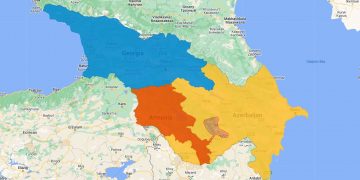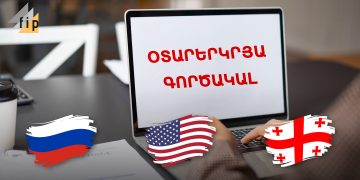After two days of demonstrations in Tbilisi, the ruling Georgian Dream party announced on March 9 the decision to withdraw the bill on foreign agents.
On March 7, the Georgian parliament approved the bill in first reading, which led to mass protests in Tbilisi, accompanied by the arrests of demonstrators, injuries among policemen and protesters. The police used tear gas and water cannons against the protesters.
These events became the main topic of media coverage not only in Georgia, but also in international, including Armenian media.
The Fact Investigation Platform studied how “pro-Western” and “pro-Russian” Armenian-language media in Armenia covered the events in Georgia.
What happened in Georgia?
Under the already withdrawn bill, civil society groups and media organizations that receive at least 20 percent of their funding from abroad must register as agents of foreign influence and be monitored by the country’s Ministry of Justice. Fines and prison terms were envisaged if the provisions of the bill were not obeyed.
Opponents of the bill call it a “Russian law,” arguing that it is similar to a law in place in Russia since 2012 that has been used to suppress civil society and reduce criticism of the government. Another similar bill is also being discussed, the prototype of which is considered to be the American law, but this draft did not reach the Georgian parliament.
Notably, Western countries and organizations have strongly criticized the circulation of the bill. In particular, High Representative of the European Union for Foreign Affairs and Security Policy, Josep Borrell, stated that the bill is incompatible with the values and standards of the European Union. The US Embassy in Georgia, for its part, stated that the adoption of such a law will harm Georgia’s relations with its strategic partners. “This process raises questions about the ruling party’s true commitment to Euro-Atlantic integration,” the statement said.
It should be noted that according to the Constitution of Georgia, the constitutional bodies should take all measures within their powers to ensure the full integration of Georgia into the European Union and NATO.
Armenian media coverage of the events in Tbilisi
The perspective of “pro-Russian” media
Armenian media perceived as pro-Russian mainly presented the events in Georgia in the context of Russia-West confrontation.
The “Iravunk” online newspaper came up with the harshest wording. In particular, they claimed that a classic “color coup” is taking place in Georgia. “During the rallies in Tbilisi, not only the US and EU flags were visible, but also the Ukrainian flag was brought to the fore. Moreover, the national anthem of Ukraine was also played at the protests. This also confirms that a classic “color coup” scenario is actually taking place in Georgia, as well as that it will be followed by the involvement of the country in the Ukrainian war.”
A number of articles claim that the “revolution” is being carried out by the Americans (Article 1, Article 2, Article 3)
“The matter has come to the point that Georgia is threatened with sanctions if the authorities suddenly try to confront the “revolutionaries”, one of the articles reads.
The main emphasis is on the non-peaceful nature of the protests. The protestors are called “Saakashvili’s supporters”.
“5TV“ channel presented the events in relatively more neutral terms. The website of the TV company republished the post of Andranik Tevanyan, deputy of the “Armenia” faction of the National Assembly, who claimed that the authorities of Georgia, unlike Armenia, do not want Georgia to become a scene of conflict between the West and Russia, a second Ukraine.
“5TV” channel also published the post of Varuzhan Geghamyan, in which the latter claims that what is happening in Georgia should not cause joy or enthusiasm, but on the contrary, deep concern. According to him, if the situation worsens, if there is a change of power, as a result of which Georgia will almost inevitably turn into a new front of the war against Russia, the Upper Lars will most likely be closed. According to Geghamyan, the Armenian supporters of the Georgian protesters “are the same people who are in favor of the new capitulation of Armenia by Turkey and Azerbaijan.”
The 168.am news website also shared Geghamyan’s post without further comment and context. In other articles, the site has refrained from commenting, presenting the bills as Georgian and American. The perspective of the Georgian authorities is presented, that the bill has no relation with the similar Russian law.
The Armenian service of the Russian state “Sputnik” agency almost did not refer to the fact that a similar law has been in force in the Russian Federation since 2012, which became the main reason for the protestors’ dissatisfaction. The bills are presented as “Georgian” and “American”.
Do not make Moscow nervous. “Pro-Western” media coverage
1in.am covered the events taking place in Georgia not only with informative articles, but also with explanatory materials and interviews, with an emphasized criticism of the bill.
In an interview on March 8, former Ambassador of Georgia to Russia (2004-05) Valery Chechelashvili strongly criticized the discussion of the bill. According to him, the authorities of Georgia have been pursuing a policy of not annoying Moscow for a long time, and all their actions contradict the Georgian constitution, according to which the country must steadily move towards European integration.
The Armenian service of the American radio station “Radio Liberty” covered the events mainly in a purely news genre, without outstanding analysis. Both the point of view of the Georgian government, the author of the bill, and the position of the protesters were presented. Aggressive actions of the police against the protesters were emphasized. In addition, it was emphasized that they are fighting against the “Russian” law imposed by the Russian Federation.
Factor.am presented the events in Georgia through various interviews and information materials as a regression of democracy, referring to Western officials and human rights organizations. Eduard Ayvazyan, the director of the Samtskhe-Javakhk Media Analytical Center, stated in an interview with Factor TV that there is a general suspicion that the bill was introduced so that the EU can reject Georgia, and the second suspicion is that it was done by Russia. “Russia’s goal is to suffocate Georgia and finally solve the issue of Armenia,” he added.
Lragir.am did not actively cover the demonstrations in Georgia, merely presenting the main events. Perhaps an exception is the article by Samvel Aslikyan, a member of the National-Democratic Pole, where he states that Georgia and Armenia have a value for the West in the context of the “North-South” geopolitical, transport axis.
Other media
“Armenpress” state agency used mainly Russian sources in covering the events in Georgia (TASS, Interfax, Sputnik).
The online version of “Aravot” newspaper referred to various authoritative international sources, presenting the events from the point of view of both the authorities and the protesters. The Editor-in-Chief Aram Abrahamyan writes, “Yes, Russia is interested in having a more or less loyal government remain in power, which will not join the Western sanctions against Russia. The “foreign agents” law, yes, targets Georgians, conventionally speaking, “Sorosians” who could become the driving force behind a possible power change. But it’s not like the West is paying attention to democracy.”
Abrahamyan also put forward the version regarding the closure of the roads to Armenia, like Varuzhan Geghamyan did. “…it is hard to believe that the West is very concerned about democracy in Georgia. They need the country to join the sanctions against Russia. The problems Armenia will face do not require lengthy explanation. Just the fact that the Russian-Georgian border (including the air border) will face the risk of being closed is already enough to imagine it.”
Tert.am and News.am mainly presented the topic from a neutral point of view, referring to Georgian, international and Russian sources. Tert.am reposted Armenia Alliance MP Lilit Galstyan’s post, according to which there is a serious reason behind what happened in the Georgian Parliament. “It is a value and ideological confrontation where the defenders of national statehood, the supporters of stopping the loss of the country’s immunity, the defenders of national interests and security are positioned. On the other side is the opposite wing, the opposite thinking, the pioneers and beneficiaries of the Color or Rose Revolution.”
Thus, two groups of Armenian media covered the events in Georgia with certain emphasis. The media perceived as pro-Russian mainly emphasize that the West is trying to turn Georgia into a second Ukraine and stage a coup, while the media perceived as pro-Western emphasize that the bill was put into circulation under the pressure of Russia and is aimed at undermining democracy in Georgia.
Loosineh Voskanyan

 FACTOMETER
FACTOMETER








